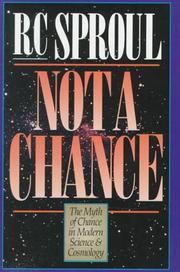Check nearby libraries
Buy this book

Announcing the launch of the Hubble Space Telescope, the news reporter began: "Fifteen to 17 billion years ago the universe exploded into being." "Exploded into being?" mused R. C. Sproul. "Does this mean that 15 billion years ago the universe exploded from non-being into being? Then what exploded?" In Not a Chance Sproul takes a hard look at such conundrums: Just what is chance? Can it account for what is?
As a respected Christian apologist, theologian, and philosopher, R. C. Sproul might be expected to find causation through chance a hard pill to swallow. But in Not a Chance we learn that he is not alone.
Among others troubled by chance probability ... David Hume: "Chance is only our ignorance of real causes"; Charles Darwin: "I cannot look at the universe as a result of blind chance."; Albert Einstein: "Quantum physics is certainly imposing, but an inner voice tells me that it is not yet the real thing ... I, at any rate, am convinced that He is not playing at dice.".
In a lively dialog with modern thinkers from Hume to Niels Bohr and Carl Sagan, Not a Chance consults laws of logic, linguistic and scientific theory, and mathematical understandings to probe the cause-effect relationship. Not a Chance invites all students of life to approach, with eyes open and mind alert, the wobbly pedestal from which chance rules modern cosmology.
Check nearby libraries
Buy this book

Previews available in: English
| Edition | Availability |
|---|---|
|
1
Not a chance: the myth of chance in modern science and cosmology
1994, Baker Books
Hardcover
in English
0801083869 9780801083860
|
aaaa
Libraries near you:
WorldCat
|
Book Details
Table of Contents
Edition Notes
Includes bibliographical references (p. 221-223) and index.
Classifications
The Physical Object
ID Numbers
Source records
Internet Archive item recordmarc_evangelical_seminary MARC record
Library of Congress MARC record
Internet Archive item record
amazon.com record
marc_columbia MARC record
Better World Books record
Work Description
Announcing the launch of the Hubble Space Telescope, the news reporter began: "Fifteen to 17 billion years ago the universe exploded into being." "Exploded into being?" mused R. C. Sproul. "Does this mean that 15 billion years ago the universe exploded from non-being into being? Then what exploded?" In Not a Chance Sproul takes a hard look at such conundrums: Just what is chance? Can it account for what is? As a respected Christian apologist, theologian, and philosopher, R. C. Sproul might be expected to find causation through chance a hard pill to swallow. But in Not a Chance we learn that he is not alone. Among others troubled by chance probability ... David Hume: "Chance is only our ignorance of real causes"; Charles Darwin: "I cannot look at the universe as a result of blind chance."; Albert Einstein: "Quantum physics is certainly imposing, but an inner voice tells me that it is not yet the real thing ... I, at any rate, am convinced that He is not playing at dice." In a lively dialog with modern thinkers from Hume to Niels Bohr and Carl Sagan, Not a Chance consults laws of logic, linguistic and scientific theory, and mathematical understandings to probe the cause-effect relationship. Not a Chance invites all students of life to approach, with eyes open and mind alert, the wobbly pedestal from which chance rules modern cosmology.
Community Reviews (0)
Feedback?| August 18, 2021 | Edited by MARC Bot | import existing book |
| August 27, 2014 | Edited by Bryan Tyson | Edited without comment. |
| April 28, 2010 | Edited by Open Library Bot | Linked existing covers to the work. |
| March 20, 2010 | Created by WorkBot | work found |










